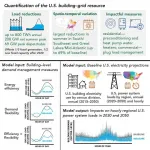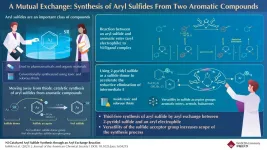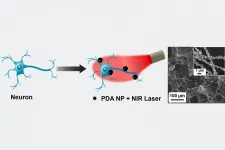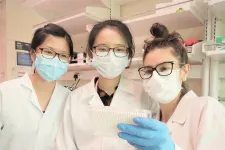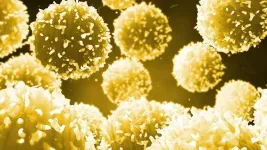(Press-News.org) In the United States, climate change is controversial, which makes communicating about the subject a tricky proposition.
A recent study by Portland State researchers Brianne Suldovsky, assistant professor of communication, and Daniel Taylor-Rodriguez, assistant professor of statistics, explored how liberals and conservatives in Oregon think about climate science to get a better sense for what communication strategies might be most effective at reaching people with different political ideologies. The study was published in Climatic Change in June.
Prior studies have shown that exposing climate change skeptics, who are more likely to be conservatives, to more science is unlikely to change the way they think about the issue. Instead, Suldovsky and Taylor-Rodriguez found that a more fruitful strategy may be to give conservatives opportunities to share their own lived experiences with the effects of climate change.
To learn more about how liberals and conservatives differ in how they think about climate change, Suldovksy and Taylor-Rodriguez created an online survey that was completed by 1,049 Oregonians. The participants ranged from age 18 to 86 and closely mirrored the demographics of the state in terms of sex, race, age and education. There was also ample representation from different political groups; 43% of participants were moderates, 30% were liberals and 27% were conservatives.
The survey asked participants questions about how they thought about climate change, and included questions about how certain they were that climate change is happening; how complicated or complex they think climate science is; and who they rely on to give them knowledge about climate change -- their own direct lived experience or experts. The survey also measured how participants prefer to engage with climate science. The researchers then used a statistical tool called multivariate regression to figure out what factors predicted engagement preferences.
"The most interesting thing to me is that liberals and conservatives are just seeing climate science from a completely different epistemic vantage point," says Suldovsky about the results.
The survey showed that liberals see climate science and climate change as certain and simple. They don't think it's very complicated to understand, and they also don't think it's going to be refuted in the future. Liberals also defer to scientific experts about climate change to such an extent that they reported that they would defer to what a scientist says about climate change even if it contradicts their own experience.
"That's a pretty bold thing to agree with," says Suldovsky. "That was pretty shocking to me."
By contrast, conservatives saw climate science completely differently. "They see it as far less certain and far more complex, [the latter] is super interesting because in that way conservatives are more in line with climate scientists," says Suldovsky. Conservatives also rely more on their own direct lived experience to give them knowledge about the world and knowledge about climate change.
"That has huge implications for the way that we engage with conservatives because, up until this point, the approach has been to shove more information from climate scientists at them and that'll do the trick, and it doesn't," says Suldovsky. "One of the things that our study is showing is that [resistance] might be because conservatives are looking to a different source to give them knowledge about climate change: their own direct lived experience."
The results also showed that people who believe that climate change is certain and simple--like liberals tend to--prefer receiving more information from experts. This one-way knowledge transfer is also called the deficit model of science communication and has been the standard communication strategy. By contrast, people who rely on their own experience and see climate change as complicated and fairly uncertain--like conservatives tend to--prefer what is called a lay expertise model of engagement. This means they value being able to contribute their own knowledge and experience to help better understand climate change.
These findings suggest that people who communicate about climate change may benefit from a shift of perspective.
"Attending to people's philosophical beliefs might get us beyond this place where we focus on the facts," says Suldovsky. "This study demonstrates we can go deeper than that and ask questions and measure how people are seeing the world. That might get us a little bit further."
Suldovsky herself changed her views on climate change, in part thanks to philosophy.
"I grew up very conservative. I grew up in northern Idaho. I grew up very religious. I didn't accept evolution. I didn't accept climate science and so I know what it feels like to feel like science is your adversary," she says. "And what changed my mind was philosophy, learning that there are different ways to think about the world and different ways to think about knowledge."
Instead of presenting science as the only answer, Suldovsky suggests it could be presented as a piece of the puzzle that is combined with other perspectives and ways of knowing that fill in the rest of the puzzle. An example of this approach could involve asking fishermen, farmers and ranchers what changes they have noticed over the past few decades.
Focusing on the effects of climate change might help get buy-in for mitigation strategies from people of different political ideologies. Take dealing with rising sea levels or heat waves, for example. "Sea level rise is something that we can infrastructurally deal with without people agreeing on why that sea level rise is occuring," says Suldovsky. "Cities can plan for increased heat waves without convincing people that climate change is causing the heat waves."
The results of this study also suggest that climate science--and other controversial scientific topics such as GMOs and vaccines--could benefit from an expanded understanding of science communication.
"Just broadening our conception of what communication and engagement can look like to include things like public forums or transdisciplinary science where you're involving multiple perspectives and problem solving would be helpful," says Suldovsky.
Suldovsky and Taylor-Rodriguez are now following up this study by looking at the relationship between extreme weather perceptions, the actual weather and climate change beliefs.
INFORMATION:
Over the past six months, the World Health Organization has categorized four SARS-CoV-2 variants as being "of concern" because they are more transmissible or may escape the immune response. They have been termed the Alpha, Beta, Gamma and Delta variants. Scientists from the Institut Pasteur, in collaboration with the French National Health Insurance Fund (CNAM), Ipsos and Santé publique France, conducted a nationwide case-control study to evaluate the effectiveness of mRNA vaccines against symptomatic forms of SARS-CoV-2 infection, be that non-variant virus or the Alpha and Beta variants. The results show that the two-dose vaccination regimen of mRNA vaccines provides 88% protection against non-variant virus, 86% against the Alpha variant and 77% against the Beta ...
Tsukuba, Japan - Rice is the world's most commonly grown and consumed crop. It also supports lives and livelihoods, especially in low- and middle-income regions. As such, methods for securing abundant and profitable rice harvests are key in global food security.
The System of Rice Intensification (SRI) offers a repeatable, sustainable system for increasing rice yields. It brings together fundamental planting and harvesting techniques such as strategically spacing plants, minimizing water, and transplanting seedlings. These practices can be repeated in varying conditions. While SRI has been around since ...
Since buildings consume 75% of electricity in the U.S., they offer great potential for saving energy and reducing the demands on our rapidly changing electric grid. But how much, where, and through which strategies could better management of building energy use actually impact the electricity system?
A comprehensive new study led by researchers from the Department of Energy's Lawrence Berkeley National Laboratory (Berkeley Lab) answers these questions, quantifying what can be done to make buildings more energy efficient and flexible in granular detail by both time (including time of day and year) and space (looking at regions across the U.S.). The research team, which also included scientists from the National Renewable Energy Laboratory (NREL), found that ...
Aryl sulfide, an aromatic compound in which sulfur is attached to an aryl (a functional group derived from an aromatic ring), is found in biologically active materials effective against asthma, Alzheimer's disease, and cancer. As a result, chemists have shown a lot of interest in synthesizing aryl sulfides. Traditionally, carbon-sulfur (C-S) bond formation reactions between thiols and aryl electrophiles catalyzed by transition metals have been employed for aryl sulfide synthesis because of their high reliability. However, thiols have an unpleasant smell and are toxic. Could there be a way to synthesize aryl sulfides that avoids the ...
A new study of almost 12,000 Australians has found one-third of the adult population has experienced pure cybercrime during their lifetime, with 14% reporting this disruption to network systems in the past 12 months.
With all forms of cybercrime already costing trillions every year globally, experts from the Australian Institute of Criminology (AIC) and Flinders University say the crimes involved substantial levels of personal victimisation including direct losses as well as the high cost of preventing future attacks.
A pre-COVID-19 snapshot of the cost of 'pure cybercrime' in 2019 has found an approximate ...
Nanomaterials have been used in a variety of emerging applications, such as in targeted pharmaceuticals or to bolster other materials and products such as sensors and energy harvesting and storage devices. A team in the McKelvey School of Engineering at Washington University in St. Louis is using nanoparticles as heaters to manipulate the electrical activity of neurons in the brain and of cardiomyocytes in the heart.
The findings, published July 3, 2021, in Advanced Materials, have the potential to be translated to other types of excitable cells and serve as a valuable tool in nano-neuroengineering.
Srikanth Singamaneni, a materials scientist, and Barani Raman, a biomedical engineer, and their teams collaborated to develop a noninvasive technology that inhibits the electrical ...
It's hard to save what you can't identify. That's been a problem for the endangered salt marsh harvest mouse, which is found only in the salty, brackish waters of the San Francisco Bay area. The mouse competes for space with about eight million humans, and more than three-quarters of its habitat has been eaten by development and land conversion. That loss is expected to increase amid rising sea levels.
Conserving the population has proven tricky, in part because it looks so much like another mouse in the area--the western harvest mouse--that is abundant throughout western U.S.
But scientists from UC Davis have developed a tool, a "decision ...
Researchers from the Antimicrobial Resistance (AMR) Interdisciplinary Research Group (IRG) at Singapore-MIT Alliance for Research and Technology (SMART), MIT's research enterprise in Singapore, alongside collaborators from Biobot Analytics, Nanyang Technological University (NTU) and Massachusetts Institute of Technology (MIT), have successfully developed an innovative, open-source molecular detection method that is able to detect and quantify the B.1.1.7 (Alpha) variant of SARS-CoV-2. The breakthrough paves the way for rapid, inexpensive surveillance of other SARS-CoV-2 variants in wastewater.
As the world continues to battle and contain COVID-19, the recent identification of SARS-CoV-2 variants with higher transmissibility and increased severity has made the development ...
COLUMBUS, Ohio - The parasites that cause severe malaria are well-known for the sinister ways they infect humans, but new research may lead to drugs that could block one of their most reliable weapons: interference with the immune response.
In the study, scientists defined the atomic-level architecture of the connection between a protein on the surface of a parasite-infected red blood cell when it binds to a receptor on the surface of an immune cell.
When that protein-receptor connection is made under normal circumstances, the infected red blood cell, hijacked by the disease-causing parasite, de-activates the immune cell - meaning the body won't fight the infection. A drug designed to fit into that space could block the interaction, allowing the immune system to get to work clearing ...
LA JOLLA, CA--You can't make a banana split without bananas. And you can't generate stable regulatory T cells without Vitamin C or enzymes called TET proteins, it appears.
Regulatory T cells (Tregs) help control inflammation and autoimmunity in the body. Tregs are so important, in fact, that scientists are working to generate stable induced Tregs (iTregs) in vitro for use as treatments for autoimmune diseases as well as rejection to transplanted organs. Unfortunately, it has proven difficult to find the right molecular ingredients to induce stable iTregs.
Now scientists at La Jolla Institute for Immunology ...

